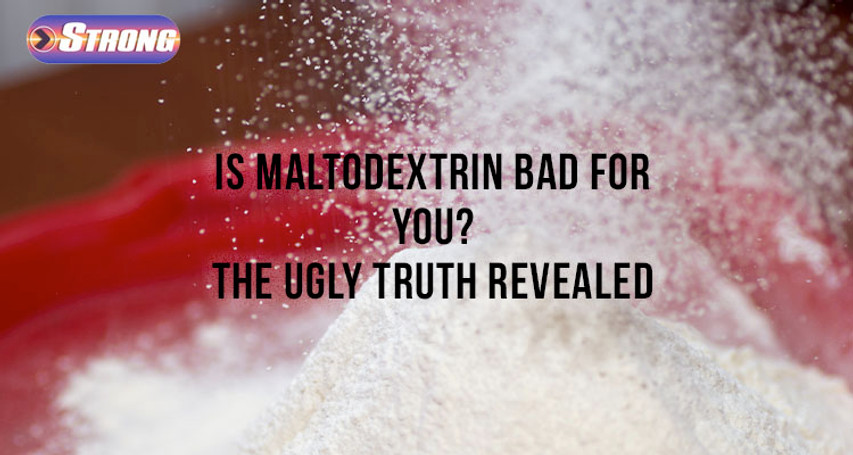Is Maltodextrin Bad for You? The Ugly Truth Revealed
Posted by Leonard Shemtob on Jun 19, 2023
Is Maltodextrin Bad for You? The Ugly Truth Revealed
Did you know that maltodextrin is a common ingredient in many of the foods and drinks we consume daily? While it may seem harmless, this ubiquitous dietary polysaccharide could potentially impact your health in various ways. Let's delve into the world of maltodextrin and reveal the ugly truth behind this seemingly innocent food additive, answering the question: is maltodextrin bad for you?
Short Summary
- Maltodextrin is a processed white powder used as an additive in food products, but it has a high glycemic index and potential adverse reactions.
- The FDA considers maltodextrin safe when consumed in moderation, but recommends substituting with healthier alternatives due to its high GI.
- Reducing consumption of maltodextrin by replacing processed foods with natural sweeteners can improve overall health.
Understanding Maltodextrin
Maltodextrin is a white powder, highly processed from various starches such as corn, rice, potato starch, and wheat. It is widely used in the food industry due to its many beneficial properties. This refined substance has a neutral flavor and is composed of less than 20% sugar after hydrolysis. Although it lacks any real nutritional value, maltodextrin is commonly found in packaged foods as a thickening agent, sweetener, or to extend their shelf life.
Despite its widespread use, maltodextrin could potentially cause adverse reactions, such as rash or skin irritation, asthma, cramping, or difficulty breathing. However, it is usually considered safe for those with celiac disease or gluten intolerance, as the gluten is eliminated during the production process.
The main concern with maltodextrin is its high glycemic index, which can range from 85 to 136.
Ubiquitous dietary polysaccharide maltodextrin
As a widely consumed polysaccharide, maltodextrin is commonly used as a food additive and is often derived from genetically modified foods, such as corn. Maltodextrin's effect on blood sugar levels is a concern for individuals with diabetes, but it is generally considered safe for those with celiac disease or gluten intolerance.
While maltodextrin may be safe for most people, it's important to be aware of its potential impact on gut health. Studies have shown that excessive consumption can alter gut bacteria, potentially increasing the risk of illness. This is why it's crucial to monitor your maltodextrin intake and opt for healthier alternatives when possible.
The FDA's Stance on Maltodextrin
The United States Food and Drug Administration (FDA) has cleared maltodextrin as a safe food additive. It has been classified as Generally Recognized as Safe (GRAS). This means that, according to the FDA, maltodextrin can be safely consumed in moderation.
However, it's important to keep in mind that maltodextrin has a high glycemic index, which may result in elevated blood sugar levels and potential weight gain. To minimize these risks, it is recommended to substitute maltodextrin with healthier alternatives and avoid processed foods that contain this additive.
Maltodextrin's Impact on Blood Sugar Levels
Maltodextrin has been observed to cause a rapid increase in blood sugar levels. This is particularly concerning for individuals with diabetes, who need to closely monitor their blood sugar. If you experience symptoms such as increased thirst, frequent urination, or fatigue after consuming maltodextrin, it's important to check your blood sugar levels and contact your doctor if they are too high.
To minimize the impact of maltodextrin on blood sugar levels, it's essential to count it towards your daily carbohydrate intake and monitor your glucose levels accordingly. Remember, moderation is key when it comes to consuming maltodextrin and maintaining optimal health.
Maltodextrin and Gut Health
Research suggests that maltodextrin may negatively impact gut bacteria, potentially resulting in inflammatory conditions due to an increase in harmful bacteria and a decrease in beneficial bacteria. Maltodextrin has been shown to increase the activity of Escherichia coli bacteria, which may contribute to Crohn's disease, an inflammatory bowel disorder.
On the other hand, some studies indicate that maltodextrin's fermentation in the intestines may act as a protective agent against colorectal cancer. However, more research is needed to fully understand the complex relationship between maltodextrin and gut health.
In the meantime, it's best to err on the side of caution and limit your intake when you consume maltodextrin for optimal digestive health.
Weight Gain and Maltodextrin

As a sweetener and carbohydrate, maltodextrin can contribute to weight gain due to its lack of nutritional value and potential to cause blood sugar spikes, similar to table sugar. Consuming excessive amounts of maltodextrin, along with other carbohydrates, can lead to weight gain.
To avoid unwanted weight gain, it's important to be mindful of your maltodextrin intake. Opt for healthier alternatives when possible and maintain a balanced diet that includes whole, unprocessed foods. This approach will not only help you manage your weight, but also support overall health and well-being.
Resistant Maltodextrin: A Healthier Alternative?
Resistant maltodextrin is an indigestible fiber that may offer potential health benefits. Unlike regular maltodextrin, digestion resistant maltodextrin is not broken down during digestion and can promote regular bowel movements and relieve constipation. Research has also indicated that resistant maltodextrin may lead to beneficial physiological changes, such as enhanced body composition and regulation of blood glucose levels.
Although resistant maltodextrin may offer some advantages over regular maltodextrin, it's essential to remember that moderation is key. As with any food additive, it's important to consume resistant maltodextrin in moderation and prioritize a balanced diet of whole, unprocessed foods for optimal health.
Maltodextrin in Sports Drinks and Snacks
Maltodextrin is a popular ingredient in sports drinks and snacks due to its ability to provide a fast-digesting carbohydrate and a good source of quick calories for athletes. It helps to rapidly restore glycogen stores in the muscles, thereby facilitating recovery after or between workouts.
Interestingly, a combination of fructose and maltodextrin in sports drinks may be even more effective at providing athletes with the energy they need during exercise. This is because the combined sugars can be absorbed more efficiently, allowing for better fuel utilization and ultimately, improved performance.
The Best Intra Workout Carbohydrate Supplement
The highest quality carbohydrate intra workout supplement is currently FORMULA 19 by Blackstone Labs. It combines three rapidly digesting carbohydrates but without the unwanted insulin spike.
Glucose Disposal Agents
Glucose Disposal Agents also known as GDA's can help regulate insulin levels due to their impressive effect on glucose metabolism. They assist you by regulating glucose storage, increasing insulin sensitivity and providing essential nutrients. A top GDA supplement on the market today is Glycolog by BSL and it provides a great formula of efficient ingredients aimed at acting like the hormone insulin and shuttling the carbs you eat to your muscles to be used for fuel and muscle building in lieu of being stored as fat.
Genetically Modified (GMO) Maltodextrin

Maltodextrin is a processed carbohydrate. It is commonly derived from genetically modified (GMO) corn. While GMOs are a subject of ongoing debate, it's worth noting that certified organic products containing maltodextrin do not contain GMOs. This means that if you're concerned about GMOs in your diet, opting for certified organic products can help you avoid genetically modified maltodextrin.
Although the safety of GMOs is still being studied, it's crucial to make informed decisions about the foods and additives you consume, including salad dressings. By choosing organic products and prioritizing a diet of whole, unprocessed foods, you can minimize your exposure to potentially harmful substances and support your overall health.
Substituting Maltodextrin with Healthier Alternatives
If you're looking to reduce your maltodextrin intake, there are several healthier alternatives to consider. Pectin, guar gum, sugar alcohols, and stevia are all viable substitutes for maltodextrin, depending on your specific needs. By opting for these alternatives, you can still enjoy the sweet or thickening properties of maltodextrin without the potential health risks associated with its consumption.
One of the easiest ways to avoid maltodextrin altogether is to consume whole, unprocessed foods. By focusing on a diet rich in fruits, vegetables, whole grains, and lean proteins, you can minimize your exposure to maltodextrin and other potentially harmful food additives while supporting overall health and well-being.
Reducing Maltodextrin Consumption
Reducing maltodextrin consumption is key to maintaining optimal health. By avoiding processed foods that contain maltodextrin and opting for natural sweeteners and other thickening agents, you can minimize your exposure to this potentially harmful additive.
In addition to choosing healthier alternatives, it's important to be mindful of portion sizes and overall diet quality. By focusing on a balanced diet that includes a variety of nutrient-dense, whole foods, you can reduce your maltodextrin intake and support optimal health and well-being.
Summary
In conclusion, while maltodextrin is a common food additive considered safe by the FDA, it's important to be aware of its potential impacts on blood sugar levels, gut health, and weight gain. By reducing your maltodextrin consumption and opting for healthier alternatives, you can take control of your diet and make informed choices that support your overall health and well-being.
Frequently Asked Questions
What does maltodextrin do to your body?
Maltodextrin has been deemed safe by the FDA, however research conducted by Cleveland Clinic suggests that it may affect the bacteria in our gut. This process of altering gut bacteria can cause problems with digestion, potentially leading to irritable bowel disease (IBD).
Therefore, it is important to keep an eye on maltodextrin consumption and ensure proper digestive health.
Should I avoid maltodextrin?
Based on the information provided, it is best to avoid maltodextrin as its high glycemic index can cause spikes in your blood sugar levels.
If you have diabetes or insulin resistance, limiting or avoiding maltodextrin altogether is recommended.
What are the negative health effects of maltodextrin?
Regular consumption of food products containing maltodextrin has been associated with a range of negative health effects, including weight gain, type 2 diabetes, high cholesterol levels, and the alteration of gut bacteria.
Moreover, an excessive intake may lead to allergic reactions, gas, flatulence, and bloating.
Therefore, it is important to be mindful when consuming processed foods and to reduce reliance on this additive.
Which is better sugar or maltodextrin?
Considering the facts, maltodextrin is a better option than sugar. It contains the same amount of calories as sugar but has a higher GI that could cause health issues in people with insulin resistance or diabetes.
Maltodextrin also helps avoid gastrointestinal discomfort caused by simple sugars.
Is maltodextrin okay on keto?
Maltodextrin is not recommended for the keto diet because it is a high-glycemic index food that can raise blood sugar and insulin levels. This in turn can disrupt ketosis, making it difficult to stay in ketosis and reach your weight loss goals.
Thus, it is best to avoid maltodextrin when following the keto diet.
Written and Sponsored by Leonard Shemtob
Leonard Shemtob is President of Strong Supplements and a published author. Leonard has been in the supplement space for over 20 years, specializing in fitness supplements and nutrition. Leonard appears on many podcasts, written over 100 articles about supplements and has studied nutrition, supplementation and bodybuilding.
Leonard's articles have been published in many top publications around the web. Leonard enjoys weight training, playing basketball and yoga, and also enjoys hiking. In his free time he studies and works on improving himself. For more detailed information, visit his official blog.
Related Articles
Read More About Fitness & Building Muscle




